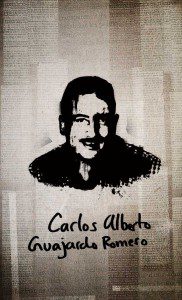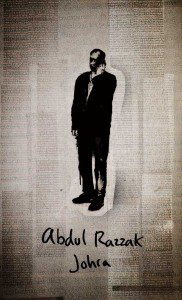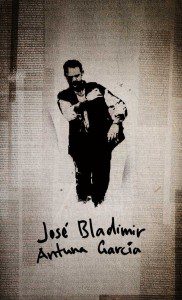5 Nov 2011 | News and features
MURDERED 5 NOVEMBER 2008
Reporter, “Expreso Matamoros”, Matamoros, Mexico
 Join us in demanding justice Carlos Alberto Guajardo Romero, the 37-year-old left home to cover a confrontation between military forces and drug traffickers in Matamoros on 5 November 2010. His pickup was reportedly shot at least 20 times as he was heading for the Secretariat of Homeland Security to gather more information. National news reports said army officers had fired at the journalist’s unmarked truck mistaking him for a gunman involved in the shooting – part of a major operation targeting Antonio Ezequiel Cárdenas Guillén, the kingpin of the Gulf drug cartel. The army deployed 150 soldiers, three helicopters and 17 vehicles; besides Guajardo and Cárdenas, three soldiers and four other gang members were killed.
Join us in demanding justice Carlos Alberto Guajardo Romero, the 37-year-old left home to cover a confrontation between military forces and drug traffickers in Matamoros on 5 November 2010. His pickup was reportedly shot at least 20 times as he was heading for the Secretariat of Homeland Security to gather more information. National news reports said army officers had fired at the journalist’s unmarked truck mistaking him for a gunman involved in the shooting – part of a major operation targeting Antonio Ezequiel Cárdenas Guillén, the kingpin of the Gulf drug cartel. The army deployed 150 soldiers, three helicopters and 17 vehicles; besides Guajardo and Cárdenas, three soldiers and four other gang members were killed.
At the same time, the government announced a strategy to protect journalists from death threats from common criminals, drug cartels and even the authorities. But IFEX members strongly denounced the programme – having been devised and run entirely by government officials.
Take action and send a letter to the authorities demanding an immediate and open investigation into this case here
International Day to End Impunity is on 23 November. Until that date, we will reveal a story each day of a journalist, writer or free expression advocate who was killed in the line of duty.
5 Nov 2011 | Events
Night of the Imprisoned Writer
Tuesday 15 November, 7.30pm (Doors at 7pm)
Venue: The Tabernacle, 34-35 Powis Square, London, W11 2AY
A unique performance evening to mark the 30th annual Day of the Imprisoned Writer, in association with ice&fire theatre company.
Hello Mr Miller, Hello Mr Pinter
Don’t miss your chance to see this special one-off performance in which the powerful words of persecuted writers from Mexico to Bahrain, from Kenya to Azerbaijan, have been woven together by award-winning playwright Sonja Linden and English PEN’s Cat Lucas. Directed by Christine Bacon and performed by Actors for Human Rights, ‘Hello…’ is both a moving celebration of PEN’s work on behalf of imprisoned and persecuted writers around the world and a concrete testament to the bravery of those writers who, often at great risk to themselves and their families, continue to speak out.
Stand Up For Writers In Prison
And because no-one speaks out quite like a comic, we’re delighted to be bringing you some of today’s finest acts to illustrate what freedom of speech is all about……
How to book
Tickets are £10 and all proceeds will go directly to English PEN’s Writers in Prison Programme.
To book, please click here: http://www.carnivalvillage.org.uk/all-events/night-of-the-imprisoned-writer/
English PEN’s Writers in Prison Programme would like to thank Richard and Elena Bridges for their invaluable support.
3 Nov 2011 | News and features

Murdered 3 November 2008
Reporter, Royal TV – Punjab, Pakistan
Join us in demanding justice for Abdul Razzak Johra, 45, dragged by six armed men from his home in the Mianwali district of Punjab, Pakistan on 3 November 2008 and shot — a day after his TV report on local drug trafficking was aired nationally. Colleagues said Johra had received threats telling him to stop covering the issue. Police acknowledged the killing but took no evident steps to investigate. In 2011, the tragic toll of dead and injured journalists and media workers placed Pakistan ahead of Iraq and Mexico as the world’s most dangerous country for reporters and media professionals.
Take action and send a letter to the authorities demanding an immediate and open investigation into this case here
International Day to End Impunity is on 23 November. Until that date, we will reveal a story each day of a journalist, writer or free expression advocate who was killed in the line of duty.
2 Nov 2011 | News and features
 MURDERED 2 NOVEMBER 2005
MURDERED 2 NOVEMBER 2005
Journalist, “El Tiempo de Durango” – Durango, Mexico
Join us in demanding justice for crime reporter José Bladimir Antuna Garcían, 39, who was found murdered on 2 November 2009 after he was ambushed by five armed men in the Mexican city of Durango on his way to work. Attached to his body was a note reading, “This happened to me for giving information to the military and for writing too much.” Antuna had been investigating corruption and police crime and had been receiving threatening calls, some from the powerful drug cartel Los Zetas. He reported the threats to the state attorney general’s office; they were never followed up.
Take action and send a letter to the authorities demanding an immediate and open investigation into this case here
International Day to End Impunity is on 23 November. Until that date, we will reveal a story each day of a journalist, writer or free expression advocate who was killed in the line of duty.
 Join us in demanding justice Carlos Alberto Guajardo Romero, the 37-year-old left home to cover a confrontation between military forces and drug traffickers in Matamoros on 5 November 2010. His pickup was reportedly shot at least 20 times as he was heading for the Secretariat of Homeland Security to gather more information. National news reports said army officers had fired at the journalist’s unmarked truck mistaking him for a gunman involved in the shooting – part of a major operation targeting Antonio Ezequiel Cárdenas Guillén, the kingpin of the Gulf drug cartel. The army deployed 150 soldiers, three helicopters and 17 vehicles; besides Guajardo and Cárdenas, three soldiers and four other gang members were killed.
Join us in demanding justice Carlos Alberto Guajardo Romero, the 37-year-old left home to cover a confrontation between military forces and drug traffickers in Matamoros on 5 November 2010. His pickup was reportedly shot at least 20 times as he was heading for the Secretariat of Homeland Security to gather more information. National news reports said army officers had fired at the journalist’s unmarked truck mistaking him for a gunman involved in the shooting – part of a major operation targeting Antonio Ezequiel Cárdenas Guillén, the kingpin of the Gulf drug cartel. The army deployed 150 soldiers, three helicopters and 17 vehicles; besides Guajardo and Cárdenas, three soldiers and four other gang members were killed.

